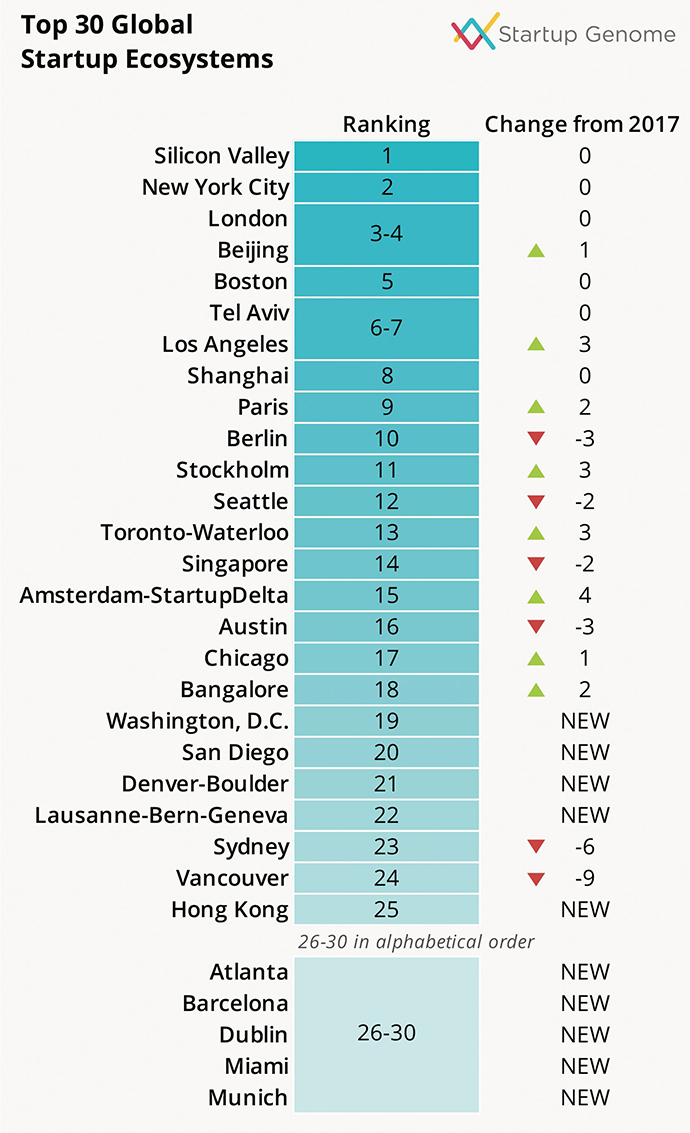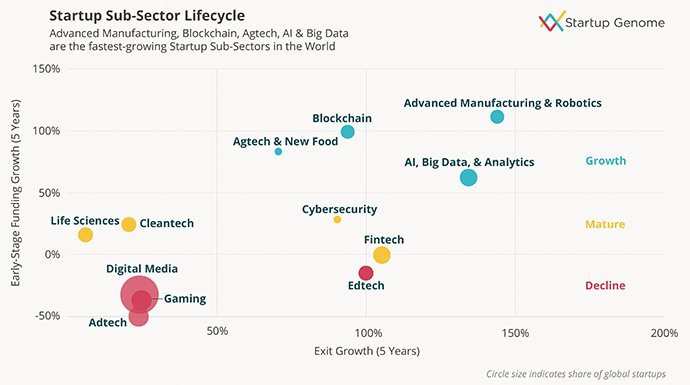The 2019 Global Startup Ecosystem Report (GSER), launched in May in high-ranking ecosystem San Francisco by Startup Genome and the Global Entrepreneurship Network (GEN), is the world’s most comprehensive research on startup ecosystems. It also offers a global ranking of life sciences ecosystems, in partnership with Paris-based Hello Tomorrow. Its findings are based on data from thousands of startup founders and research on over 1 million companies. The report assesses over 150 ecosystems across more than 30 countries.
Since 2011 — starting as a research project with Steve Blank, the father of the Lean Startup movement, and Prof. Chuck Eesley at Stanford University — the report’s publishers have been on a mission to codify and understand the success factors of startup ecosystems “so more places have a chance of creating and capturing their fair share of value created by the global startup revolution.”

One key finding shows that deep tech startups — those relying heavily on intellectual property — are the fastest-growing group globally. The four fastest-growing startup sub-sectors are advanced manufacturing & robotics, blockchain, agtech & new food, and artificial intelligence (AI). By contrast, startup sub-sectors showing decline are edtech, digital media, gaming, and adtech.
“As our economies transition to the fourth industrial revolution, we — communities driving the global startup revolution — have a major role to play,” said JF Gauthier, founder and CEO of Startup Genome. “Not only can startup ecosystems act as the top engine of job creation and economic growth, but our startups can also help solve many of our society’s biggest challenges including climate change and inequality.”
Over 2016-18, the global startup economy was worth $2.8 trillion, a 20% increase from the prior period. This is on par with G7 economies and larger than the GDP of the United Kingdom. Not every place or every person, however, is benefiting equally from the startup economy. The 10 largest startup ecosystems accounted for 68% of global exit value in 2017-18. Moreover, only 17% of tech founders are female — and in none of the more than 80 ecosystems studied did they comprise the majority.
Among other new aspects of this evolving study, this year’s report studied more than 1 million patents, in partnership with Prof. David Rigby at UCLA, tying them to specific startup sub-sectors and ecosystems, calculating the potential of each technology class, and measuring the knowledge space of each ecosystem.
Startup Genome’s Ecosystem Assessment Framework includes over 200 metrics. The 2019 rankings measure nine Success Factors:
- Performance
- Funding
- Market Reach
- Talent
- Experience
- Connectedness (new factor)
- Knowledge (new factor)
- Infrastructure (new factor, Deep Tech only)
- Policy (new factor, Deep Tech only)
Presented here with the permission of Startup Genome are key findings and observations from the 200-page report, which is accessible at https://startupgenome.com/gser2019.
Favorites Remain Strong, But There Are New Kids on the Block
Highlights from the GSER 2019 include:
Of these 10 new top ecosystems:
- The top five startup ecosystems overall in 2019 are Silicon Valley, New York City, London, Beijing and Boston. The top five ecosystems for life sciences are Silicon Valley, Boston, San Diego, New York City and London. There is no “next” Silicon Valley, says the report. Instead, “there are 30 startup ecosystems around the world that will soon lay claim to a parallel vibrancy and economic productivity.”
- Paris cracked the top 10, moving up two spots to No. 9 overall. Amsterdam-StartupDelta moved up the most, rising four spots to No. 15 overall thanks to high growth in funding, startup output and exits, strong performance in life sciences and deep tech and two billion-dollar IPOs in 2018 by Adyen and Elastic. San Diego and Washington, D.C., cracked the top 20 for the first time. And three other ecosystems also moved up in the rankings: Los Angeles (from No. 9 in 2017 to No. 6 in 2019), Stockholm (from No. 14 to No. 11), and Toronto (from No. 16 to No. 13).
- While early-stage funding for startups has more than doubled since 2011-12, it has risen by a factor of eight in agtech & new food — and quadrupled in AI. Within blockchain, the top five ecosystems are Silicon Valley, London, New York City, Singapore, and Toronto-Waterloo. Ecosystems to watch in AI include Edmonton, Jerusalem, Montreal, and Taipei City.
- Ten new ecosystems appear among the top global startup ecosystems for the first time:
- Atlanta
- Barcelona
- Denver-Boulder
- Dublin
- Hong Kong
- Lausanne-Bern-Geneva
- Miami
- Munich
- San Diego
- Washington, D.C.
- Four (Washington, D.C., San Diego, Lausanne-Bern-Geneva and Munich) have made it to the top global rankings largely aided by their strong performance in Life Sciences, which we cover in more detail in that section of the report.
- Two of the 10 — Atlanta and Denver-Boulder — had been runners-up for top 20 ecosystems in the world since 2012.
- Of the remaining four new top ecosystems, Miami does especially well in market reach, due to a high percentage of foreign customers for local startups (30%) and deep ties to Latin America’s top ecosystems.
- There are 25 startup ecosystems with an Ecosystem Value above $10 billion each. Additionally, 54 startup ecosystems boast an Ecosystem Value between $1 billion and $10 billion, creating thousands of jobs and billions in economic productivity.
- Startup ecosystems continue to emerge everywhere, across geographic regions and sub-sectors. The report uncovers varying strengths across Startup Genome’s more than 300 member ecosystems:
- Bahrain — top 15 ecosystem for affordable talent
- Barcelona — top 15 ecosystem for gaming
- Edmonton — top 5 (activation phase) ecosystem for market reach
- Greater Helsinki — top 10 ecosystem on connectedness
- Manila — top 5 (activation phase) in connectedness
- New Zealand — top 10 globally in agtech & new food
- Sydney — top 15 globally in Fintech
- Vancouver — top 10 globally in blockchain
Dealing With the ‘Techlash’
Among the analysis and commentary offered by the report’s authors is a pointed commentary called “Techlash and Tech Responsibility”:
“With many places and people falling behind, our society is paying the price: economic, political, and human,” they write. “Around the world there is real fear of job displacement by automation. The regions and people not feeling included economically are fueling many populist political movements. As Anne Case and Angus Deaton, a Nobel laureate, have documented, we have even seen a rise in ‘deaths of despair’ — by suicides and drug abuse-related — among the groups most affected by economic blight in the United States.
“Understandably, there is a ‘techlash’ happening. But less innovation is obviously not the answer, and trying to stop tech from progressing today would not be too different from trying to stop steam engines in the Industrial Revolution.

“Entrepreneurs create jobs, wealth, and innovation — and are a global force for good. As research from the Kauffman Foundation and others have extensively documented, most net new jobs come from startups and scaleups. Our own recent work with Inc. Magazine on Surge Cities in the United States has also demonstrated the relationship between wage growth for workers and tech entrepreneurship. Seattle, Silicon Valley, and Boston lead the country in wage gains for workers — all among the top 15 global startup ecosystems.
“Tech went from a small number of misfits and upstarts to become a major power in the global economy,” the report concludes. “It is up to us, the collective of startup ecosystems in the world, from Amsterdam to Jakarta, to live up to the responsibility that this growing power means.”
